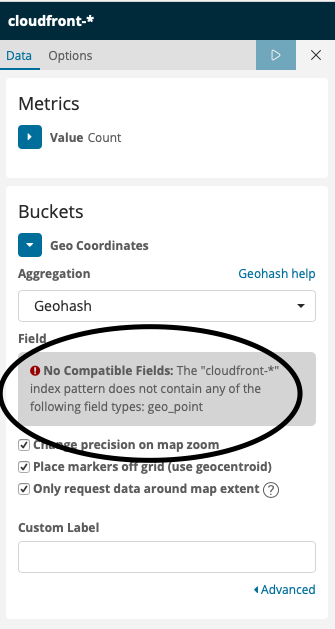-
-
Save maxkandler/35ba3a9a54cf976d4c9e2defb7288531 to your computer and use it in GitHub Desktop.
| filter { | |
| grok { | |
| match => ["message", "%{YEAR:year}-%{MONTHNUM:month}-%{MONTHDAY:day}[ \t]%{TIME:time}[ \t]%{DATA:x_edge_location}[ \t](?:%{NUMBER:sc_bytes}|-)[ \t]%{IP:c_ip}[ \t]%{WORD:cs_method}[ \t]%{HOSTNAME:cs_host}[ \t]%{NOTSPACE:cs_uri_stem}[ \t]%{NUMBER:sc_status}[ \t]%{GREEDYDATA:referrer}[ \t]%{NOTSPACE:user_agent}[ \t]%{GREEDYDATA:cs_uri_query}[ \t]%{NOTSPACE:cookie}[ \t]%{WORD:x_edge_result_type}[ \t]%{NOTSPACE:x_edge_request_id}[ \t]%{HOSTNAME:x_host_header}[ \t]%{URIPROTO:cs_protocol}[ \t]%{INT:cs_bytes}[ \t]%{NUMBER:time_taken}[ \t]%{NOTSPACE:x_forwarded_for}[ \t]%{NOTSPACE:ssl_protocol}[ \t]%{NOTSPACE:ssl_cipher}[ \t]%{NOTSPACE:x_edge_response_result_type}([ \t])?(%{NOTSPACE:cs_protocol_version})?"] | |
| } | |
| geoip { | |
| source => "c_ip" | |
| } | |
| mutate { | |
| add_field => ["listener_timestamp", "%{year}-%{month}-%{day} %{time}"] | |
| convert => { | |
| "[geoip][coordinates]" => "float" | |
| "sc_bytes" => "integer" | |
| "cs_bytes" => "integer" | |
| "time_taken" => "float" | |
| } | |
| } | |
| date { | |
| match => ["listener_timestamp", "yyyy-MM-dd HH:mm:ss"] | |
| } | |
| } |
@teebu Thanks for pointing that out.
For me it worked when I have replaced [ \t] by %{SPACE}% as shown below
%{YEAR:year}-%{MONTHNUM:month}-%{MONTHDAY:day}%{SPACE}%{TIME:time}%{SPACE}(?<x_edge_location>\b[\w-]+\b)%{SPACE}(?:%{NUMBER:sc_bytes}|-)%{SPACE}%{IPORHOST:clientip}%{SPACE}%{WORD:cs_method}%{SPACE}%{HOSTNAME:cs_host}%{SPACE}%{NOTSPACE:cs_uri_stem}%{SPACE}%{NUMBER:sc_status}%{SPACE}%{GREEDYDATA:referrer}%{SPACE}%{GREEDYDATA:agent}%{SPACE}%{GREEDYDATA:cs_uri_query}%{SPACE}%{GREEDYDATA:cookies}%{SPACE}%{WORD:x_edge_result_type}%{SPACE}%{NOTSPACE:x_edge_request_id}%{SPACE}%{HOSTNAME:x_host_header}%{SPACE}%{GREEDYDATA:cs_protocol}%{SPACE}%{INT:cs_bytes}%{SPACE}%{GREEDYDATA:time_taken}%{SPACE}%{GREEDYDATA:x_forwarded_for}%{SPACE}%{GREEDYDATA:ssl_protocol}%{SPACE}%{GREEDYDATA:ssl_cipher}%{SPACE}%{GREEDYDATA:x_edge_response_result_type}%{SPACE}%{GREEDYDATA:cs_protocol_version}
It is better to test the sample on https://grokdebug.herokuapp.com/ first.
For me, the location does not appear to be an array of coordinates, and I'm getting "No Compatible Fields: The "cloudfront-*" index pattern does not contain any of the following field types: geo_point" when I try to create a new visualization. So, it's not being correctly handled as a geo_point data type as far as I can tell. I'm starting to think my default Logstash template is missing the geoip block, or it exists but is incorrect.
Hi there, anyone tried to update this with the new Cloudfront log format?
I have been struggling for the last 2 hours, but everything I try leads to a no-match...
Hi there, anyone tried to update this with the new Cloudfront log format?
I have been struggling for the last 2 hours, but everything I try leads to a no-match...
Try the pattern from logstash-plugins/logstash-patterns-core#232 (comment)
%{DATE_EU:date}\t%{TIME:time}\t(?<x_edge_location>\b[\w\-]+\b)\t(?:%{NUMBER:sc_bytes:int}|-)\t%{IPORHOST:c_ip}\t%{WORD:cs_method}\t%{HOSTNAME:cs_host}\t%{NOTSPACE:cs_uri_stem}\t%{NUMBER:sc_status:int}\t%{GREEDYDATA:referrer}\t%{GREEDYDATA:User_Agent}\t%{GREEDYDATA:cs_uri_stem}\t%{GREEDYDATA:cookies}\t%{WORD:x_edge_result_type}\t%{NOTSPACE:x_edge_request_id}\t%{HOSTNAME:x_host_header}\t%{URIPROTO:cs_protocol}\t%{INT:cs_bytes:int}\t%{NUMBER:time_taken}\t%{DATA:x_forwarded_for}\t%{DATA:ssl_protocol}\t%{DATA:ssl_cipher}\t%{DATA:x_edge_response_result_type}\tHTTP/%{NUMBER:cs_protocol_version}\t%{DATA:fle_status}\t%{DATA:fle_encrypted_fields}\t%{DATA:c_port}\t%{NUMBER:time_to_first_byte}\t%{DATA:x_edge_detailed_result_type}\t%{DATA:sc_content_type}\t%{DATA:sc_content_len}\t%{DATA:sc_range_start}\t%{GREEDYDATA:sc_range_end}

WORD:x_edge_locationsometimes fails, because it has dash, like:MIA3-C1. I switched toDATAfield